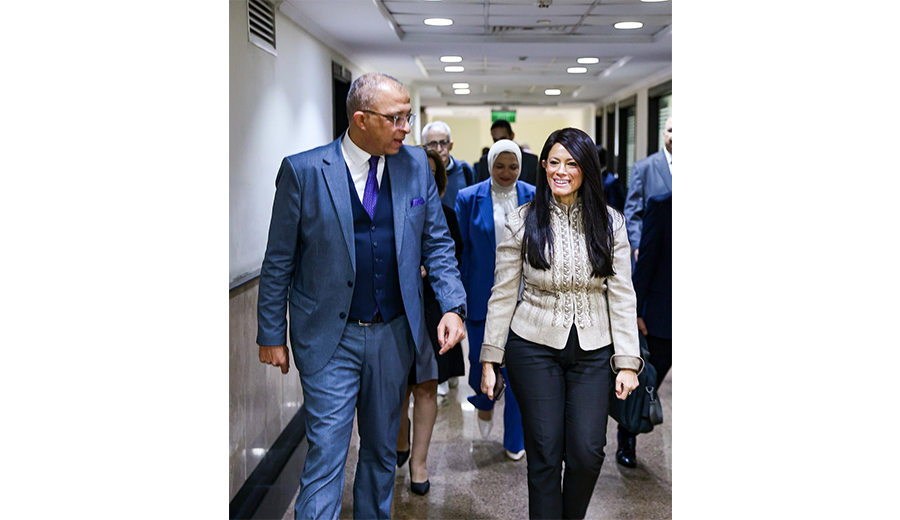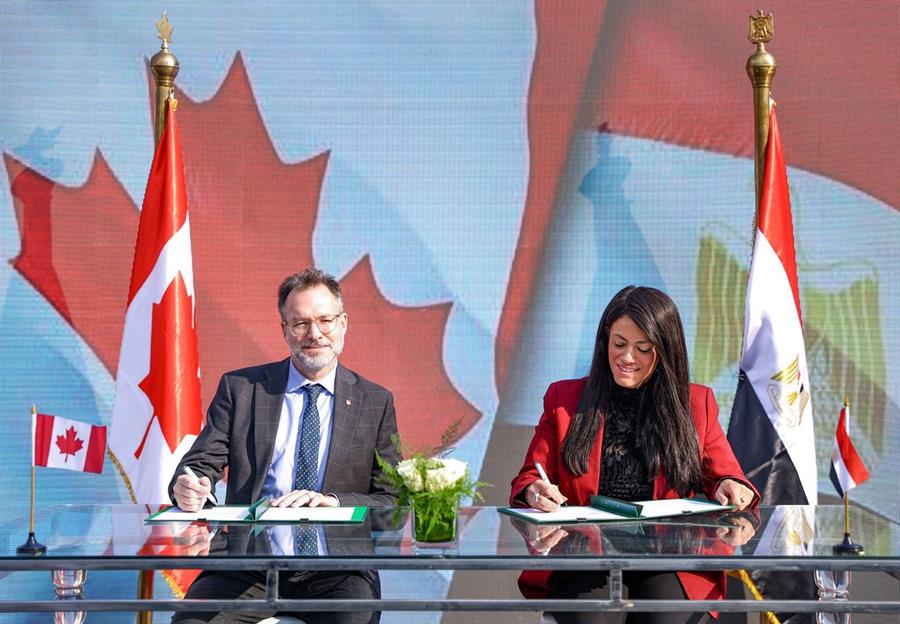The Minister of Planning and Economic Development participates in the second ministerial meeting for the environment and climate change of the Union for the Mediterranean

05 October 2021
Dr. Hala El-Said, Minister of Planning and Economic Development, participated in the second ministerial meeting for the environment and climate change of the Union for the Mediterranean, in the presence of Dr. Yasmine Fouad, Minister of Environment, Mr. Frans Timmermans, Vice-President of the European Union Commission, Green Deal, Mr. Nasser Kamel, Secretary-General of the Union for the Mediterranean, with the participation of ministers and representatives of 42 Mediterranean countries.
During her speech, Minister of Planning and Economic Development Dr. Hala El-Said said that the Mediterranean region, especially in the south of it, faces many social and economic challenges, which have recently been exacerbated by the impact of environmental degradation, climate change, and water scarcity.She referred to the IPCC report on the 1.5-degree scenario that warming in the Middle East and North Africa region is expected to be higher than the global average, even under the most optimistic 1.5-degree warming scenario.El-Said added that the Middle East and North Africa (MENA) region will continue to suffer from effects that exceed its ability to adapt, such as rising temperatures, rising sea levels, sudden changes in precipitation rates, in addition to extreme weather phenomena, explaining that such successive challenges pose risks. This could have a significant impact on agriculture and food security, potentially reversing hard-earned development gains, while also taking into account the root causes of “climate-induced migration”.El-Said added that water is a major concern and priority, and although “water” is not mentioned in the Paris Agreement, it remains an integral part of the fight against climate change, which is now increasingly having an impact on water security, in addition to the impact of other mega-projects across borders.El-Said pointed out that the outbreak of the Coronavirus is a game-changer, which is manifested by its harmful effects on health and livelihoods, in addition to its long-term geographical and sectoral effects.
El-Said explained that despite the challenges, the Egyptian government had faith that this challenge might represent an opportunity to promote and integrate the concepts of the green and circular economy into the recovery process while ensuring the implementation of key principles in terms of achieving “Inclusive Growth” and “Leaving No One Behind.”.El-Said stressed that the Egyptian government has adopted a participatory approach that includes all relevant stakeholders, including the private sector, civil society, academia, and research, as well as regional and global development partners.El-Said added that those policies included, at the level of the institutional structure, governance, and policy framework, that the Egyptian government is currently updating its sustainable development strategy (Egypt Vision 2030), which will be launched soon, to respond to emerging challenges, including population growth, climate change, and water scarcity, taking into account changes Regional Geopolitics Taking into account the impact of the coronavirus.El-Said also pointed out that the Ministry of Planning and Economic Development, in cooperation with the Ministry of Environment, launched a guide to environmental sustainability standards, intending to make the investment plan green. El-Said also pointed out that Egypt, as the first country in the Middle East and North Africa region, has launched “green bonds” worth $750 million, to finance green projects, especially in the field of clean transportation -200 million US dollars.El-Said added that Egypt is currently preparing three other national strategies, including the "National Strategy for Climate Change", provided that this strategy is consistent with the updated Vision 2030, and will include all aspects of climate change, as well as the "National Hydrogen Strategy", to explore opportunities for production, use, and transfer. Hydrogen as an energy source, especially blue and green hydrogen, in addition to the “National Water Resources Strategy”El-Said stressed the importance of the participation of all stakeholders, especially the private sector, which represents the cornerstone of successful climate policies in line with the “One Planet” initiative of sovereign wealth funds, as well as the formation of a ministerial committee to formulate a set of “economic incentives” to promote the green transformation of the private sector in Egypt.El-Said noted that the Ministry of Planning and Economic Development signed a memorandum of understanding with the Alexandria Businessmen Association, to support their efforts towards green shift.
El-Said also discussed Egypt's efforts to implement several projects to enhance its ability to adapt to climate change, referring to projects to protect the northern coasts from rising sea levels, a project to rehabilitate and cultivate 1.5 million feddans to achieve food security and compensate for land degradation and erosion in the Nile Delta, in addition to a project Rehabilitation and renewal of the national network of water canals, within the framework of modernizing traditional irrigation methods and improving the efficiency of water resource use.El-Said added that despite its contribution to only 0.7% of global greenhouse gas emissions, Egypt spares no effort to promote programs and projects to mitigate its emissions, noting that the government launched the government's "Feed Tariff for Renewable Energy", to encourage the private sector to invest in this important sector.As a result, El-Said added, Egypt now houses the world's largest solar power plant in Benban, Aswan, which was established through a multilateral partnership between the public and private sectors to generate 2 gigawatts of electricity and create decent job opportunities for the local community in Aswan.El-Said added that Egypt also hosts one of the largest wind plants in the world in the Gulf of Suez (Gebel El-Zeit), with a capacity of 300 turbines covering 100 square kilometers, and generating a total capacity of 580 megawatts.El-Said concluded by saying that developing countries should be able to assess their needs, clearly assess financial gaps, focus on the main and most vulnerable sectors, take advantage of opportunities and meet their challenges.









